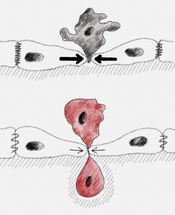Antibiotics get a “time-out”
MUHC study examines the effect of regular re-evaluation of antibiotic use on cost and C. difficile infection rates
Resistance to antibiotics is an important health concern that affects both the spread of infections, like Clostridium difficile, and the medication budget. Researchers at the McGill University Health Centre (MUHC) examined the effectiveness of adopting an antibiotic “time-out” during treatment, which involves regularly re-evaluating the treatment strategy as the clinical situation evolves. The study, published in the Annals of Internal Medicine, showed that structured time-outs, using a locally developed online checklist, resulted in decreased antibiotic costs coupled with decreased use of targeted medications. There was also a small decline in C. difficile infections.
“According the Centers for Disease Control and Prevention (CDC) nearly 50 per cent of antibiotic use is unnecessary or inappropriate,” says first author of the study Dr. Todd Lee, MUHC attending physician and assistant professor of Medicine at McGill University. “Given this statistic, and our own concerns about antimicrobial resistance, we decided to implement a tailored time-out program at the MUHC and evaluate its effectiveness.”
Time out means clinical review
The study involved 679 patients and was conducted over a period of 18 months on the internal medicine clinical teaching units at the Montreal General Hospital of the MUHC. The time-out concept was introduced to physicians and trainees as an opportunity to review the indication, dose and duration of antibiotic use when new clinical information became available. The staff were also educated on antibiotic guidelines and participated in a twice weekly structured review of all patients receiving antibiotics. This approach led to changes in doses, duration of treatment, and changes in the type of antibiotic prescribed, which in turn led to cost reductions and a small decrease in C. difficile.
“Our approach tied specific education about antibiotic use with a structural tool to review and guide this use,” says senior author of the study Dr. Louise Pilote, researcher at the Research Institute of the MUHC, chief of General Internal Medicine at the MUHC and a professor of medicine at McGill University. “This could translate into better prescribing practices. In general, physicians believed the process improved their comfort with antibiotics and provided clinical value.”
“We hope this approach will permit a more widespread implementation of antibiotic auditing and that this will affect future prescribing, turning today’s high rates of inappropriate antibiotic use into tomorrow’s historical footnote,” adds Dr. Lee.
Most read news
Other news from the department science

Get the life science industry in your inbox
By submitting this form you agree that LUMITOS AG will send you the newsletter(s) selected above by email. Your data will not be passed on to third parties. Your data will be stored and processed in accordance with our data protection regulations. LUMITOS may contact you by email for the purpose of advertising or market and opinion surveys. You can revoke your consent at any time without giving reasons to LUMITOS AG, Ernst-Augustin-Str. 2, 12489 Berlin, Germany or by e-mail at revoke@lumitos.com with effect for the future. In addition, each email contains a link to unsubscribe from the corresponding newsletter.




















































